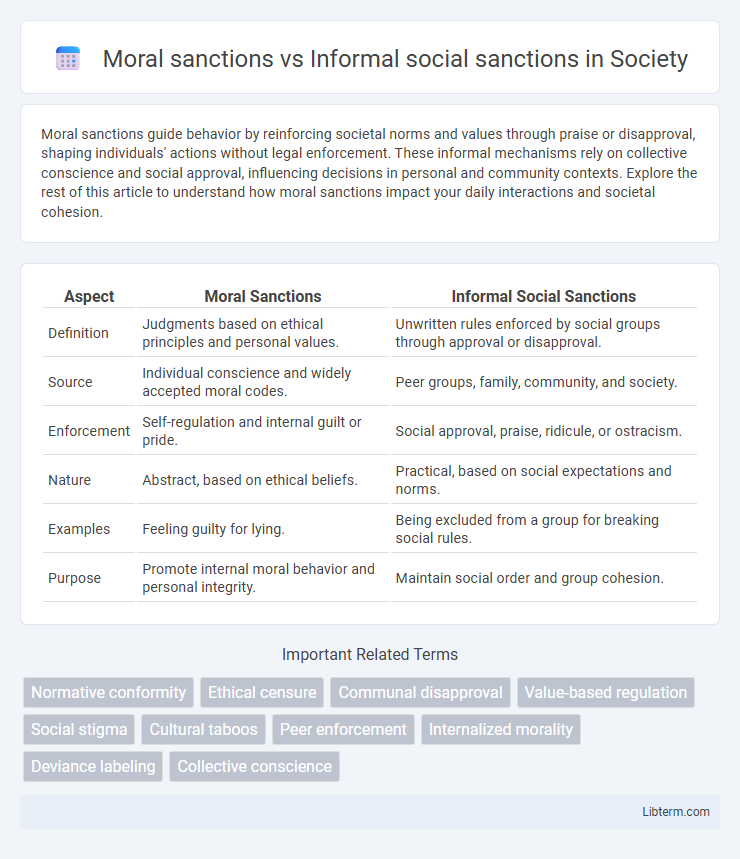Moral sanctions guide behavior by reinforcing societal norms and values through praise or disapproval, shaping individuals' actions without legal enforcement. These informal mechanisms rely on collective conscience and social approval, influencing decisions in personal and community contexts. Explore the rest of this article to understand how moral sanctions impact your daily interactions and societal cohesion.
Table of Comparison
| Aspect | Moral Sanctions | Informal Social Sanctions |
|---|---|---|
| Definition | Judgments based on ethical principles and personal values. | Unwritten rules enforced by social groups through approval or disapproval. |
| Source | Individual conscience and widely accepted moral codes. | Peer groups, family, community, and society. |
| Enforcement | Self-regulation and internal guilt or pride. | Social approval, praise, ridicule, or ostracism. |
| Nature | Abstract, based on ethical beliefs. | Practical, based on social expectations and norms. |
| Examples | Feeling guilty for lying. | Being excluded from a group for breaking social rules. |
| Purpose | Promote internal moral behavior and personal integrity. | Maintain social order and group cohesion. |
Understanding Moral Sanctions: Definition and Examples
Moral sanctions are social pressures applied to individuals based on ethical standards and values upheld by a community, often manifesting as guilt, shame, or disapproval for violations of moral codes. Examples include public condemnation for acts like dishonesty or betrayal, where the individual faces internal and external moral judgment without legal enforcement. Unlike informal social sanctions, which may include gestures or behaviors like ignoring or teasing, moral sanctions specifically target the ethical dimension of behavior, reinforcing societal norms through conscience and moral accountability.
Decoding Informal Social Sanctions: An Overview
Informal social sanctions involve subtle, community-driven responses such as peer pressure, social exclusion, or shaming that regulate behavior without formal authority or legal frameworks. These sanctions operate through cultural norms and shared values, influencing individuals by leveraging social approval or disapproval to maintain conformity. Understanding the mechanisms of informal social sanctions reveals their effectiveness in enforcing moral standards and shaping social cohesion at the grassroots level.
Origins and Foundations of Moral Sanctions
Moral sanctions originate from deeply ingrained ethical beliefs and cultural values that define right and wrong within a society, often rooted in religious teachings, philosophical doctrines, or communal norms. These sanctions rely on an internalized conscience and collective sense of duty, promoting behaviors aligned with moral principles without the need for formal enforcement. In contrast, informal social sanctions emerge from social interactions and peer pressure, enforcing conformity through approval or disapproval rather than established moral codes.
How Informal Social Sanctions Operate in Society
Informal social sanctions operate through everyday interactions and unwritten rules that guide behavior within communities, relying on mechanisms like social approval, gossip, and ostracism to enforce norms. These sanctions shape individual conduct by leveraging the desire for acceptance and fear of social exclusion, functioning effectively without formal legal authority. The subtle but pervasive nature of informal social sanctions helps maintain social order and cohesion by reinforcing shared values and expectations.
Key Differences Between Moral and Informal Social Sanctions
Moral sanctions are formalized rules reflecting ethical principles and often involve institutional enforcement, while informal social sanctions arise from everyday social interactions and peer pressure without formal authority. Moral sanctions emphasize adherence to societal norms rooted in collective values, whereas informal social sanctions focus on individual behaviors regulated through social approval or disapproval. The key difference lies in the source of enforcement: moral sanctions are backed by societal or legal institutions, and informal social sanctions depend on social relationships and community influence.
The Role of Community in Enforcing Social Sanctions
Moral sanctions rely on shared ethical beliefs within a community to guide behavior, promoting conformity through internalized values and collective approval or disapproval. Informal social sanctions operate through everyday interactions, such as peer pressure, gossip, and social exclusion, leveraging the community's influence to enforce norms without official authority. The community's role is crucial in both, as it creates and maintains the social framework where these sanctions are recognized and applied, ensuring social cohesion and order.
Moral Sanctions and Personal Conscience
Moral sanctions stem from an individual's personal conscience, reflecting internalized values and ethical principles that guide behavior and judgment of right and wrong. These sanctions enforce social norms through feelings of guilt, shame, or pride, influencing individuals to act responsibly without external enforcement. Unlike informal social sanctions which rely on peer approval or disapproval, moral sanctions are deeply rooted in personal integrity and self-regulation.
Informal Social Sanctions and Group Dynamics
Informal social sanctions, such as peer pressure, ridicule, or social exclusion, play a crucial role in shaping group dynamics by reinforcing conformity and maintaining social norms within a community. These sanctions operate subtly through interpersonal interactions and collective attitudes, influencing individual behavior without formal enforcement mechanisms. The effectiveness of informal social sanctions depends on the group's cohesion, shared values, and the perceived importance of social approval among its members.
Societal Impact: Outcomes of Sanctions Mechanisms
Moral sanctions influence societal behavior by reinforcing ethical norms through internalized guilt or pride, often leading to self-regulation and long-term adherence to social values. Informal social sanctions, such as gossip, ridicule, or social exclusion, directly shape community interactions by exerting immediate social pressure to conform to accepted behaviors. Both mechanisms play crucial roles in maintaining social order, with moral sanctions fostering internal moral development and informal sanctions ensuring conformity through social cohesion and accountability.
Evolving Trends in Moral and Informal Social Sanctions
Evolving trends in moral sanctions reveal a shift towards personalized ethical frameworks influenced by digital communication and cultural pluralism, while informal social sanctions increasingly utilize social media as a platform for immediate peer enforcement and public accountability. The integration of online communities has transformed traditional mechanisms of informal social control, amplifying collective responses and accelerating norm adaptation. Data indicates a growing interplay between moral reasoning and informal societal pressures, reshaping behavior regulation in modern, interconnected societies.
Moral sanctions Infographic

 libterm.com
libterm.com